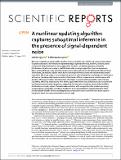A nonlinear updating algorithm captures suboptimal inference in the presence of signal-dependent noise
Author(s)
Egger, Seth W; Jazayeri, Mehrdad
Downloads41598-018-30722-0.pdf (1.951Mb)
PUBLISHER_CC
Publisher with Creative Commons License
Creative Commons Attribution
Terms of use
Metadata
Show full item recordAbstract
Bayesian models have advanced the idea that humans combine prior beliefs and sensory observations to optimize behavior. How the brain implements Bayes-optimal inference, however, remains poorly understood. Simple behavioral tasks suggest that the brain can flexibly represent probability distributions. An alternative view is that the brain relies on simple algorithms that can implement Bayes-optimal behavior only when the computational demands are low. To distinguish between these alternatives, we devised a task in which Bayes-optimal performance could not be matched by simple algorithms. We asked subjects to estimate and reproduce a time interval by combining prior information with one or two sequential measurements. In the domain of time, measurement noise increases with duration. This property takes the integration of multiple measurements beyond the reach of simple algorithms. We found that subjects were able to update their estimates using the second measurement but their performance was suboptimal, suggesting that they were unable to update full probability distributions. Instead, subjects’ behavior was consistent with an algorithm that predicts upcoming sensory signals, and applies a nonlinear function to errors in prediction to update estimates. These results indicate that the inference strategies employed by humans may deviate from Bayes-optimal integration when the computational demands are high.
Date issued
2018-08Department
Massachusetts Institute of Technology. Department of Brain and Cognitive Sciences; McGovern Institute for Brain Research at MITJournal
Scientific Reports
Publisher
Nature Publishing Group
Citation
Egger, Seth W. and Mehrdad Jazayeri. “A Nonlinear Updating Algorithm Captures Suboptimal Inference in the Presence of Signal-Dependent Noise.” Scientific Reports 8, 1 (August 2018): 12597 © 2018 The Author(s)
Version: Final published version
ISSN
2045-2322